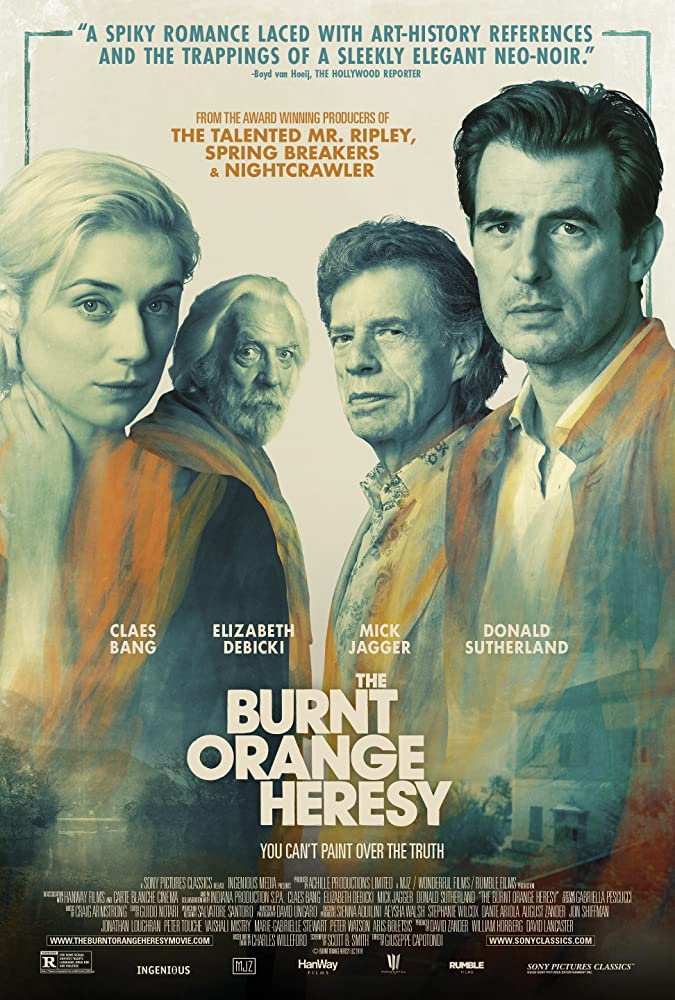The Burnt Orange Heresy
The title may be unusual, but The Burnt Orange Heresy is a fantastic film. The story begins with art critic James Figueras (Claes Bang) giving a lecture that isn't quite what it seems. That ends up being a recurring theme in the story, which is filled with characters who have ulterior motives and scenarios that reveal unanticipated complications. Atmospherically directed by Guiseppe Capotoni, based on Charles Willeford's novel, the film offers one hypnotic twist after another.
At that lecture, James meets a woman named Berenice (Widows' Elizabeth Debicki). They hook up, then he invites her to accompany him on a short road trip to visit an enigmatic art collector, Joseph Cassidy (Mick Jagger). James does not know the reason Cassidy has summoned him. It turns out that brilliant, reclusive artist Jerome Debney (Donald Sutherland) has been living in Cassidy's guest house, and might be receptive to being interviewed or showing off some of his work for the first time in decades.
The trailer for The Burnt Orange Heresy gives away a little more of the plot than I want to. For the sake of preserving the surprise, let's just say that James' career could really benefit from interviewing Debney, and Cassidy is offering him a once-in-a-lifetime opportunity that absolutely comes with strings attached. Berenice and Debney strike up a friendship after the initial meeting, which ends up throwing another monkey wrench into things later on.
The gist of James' opening presentation is that how you perceive something depends, in part, on what you know (or think you know) about it. Lacking information can lead to a poor impression; incorrect information can make it seem much better or much worse than it is. That idea runs throughout The Burnt Orange Heresy. We view certain story points in a particular way, only to reassess them as the characters reveal more detail about themselves. Similarly, James and Berenice are forced to continually reassess their situation as they learn more about what's actually happening.
Bang (The Girl in the Spider's Web) and Debicki have very strong chemistry together. The idea of two strangers spontaneously making this trek could have felt forced. We believe it, though, because the actors convince us that something is attracting them. Jagger, meanwhile, is a really shrewd choice to play Cassidy. The man is supposed to be a little intimidating, a little larger-than-life. Who better to embody such traits? He strips down his rock-and-roll swagger, yet retains the quality of being a guy who commands any room he walks into. You can feel a touch of humor in Jagger's work, as if he's met people like Cassidy in real life and is having fun mocking them.
The Burnt Orange Heresy deals with themes of desperation and deceit. I did not expect several of the turns the story takes. Those twists lead to an ending that wraps things up while still leaving ramifications for James that viewers can contemplate for themselves. Written by Scott B. Smith (A Simple Plan, The Ruins), the film's slightly heightened dialogue may strike some viewers as pretentious. None of the characters misses a chance to speak with a flourish. I think such language adds to the ambiance of a very compelling mystery – one where everybody has a secret, and the person who can keep theirs the longest will win.
out of four
The Burnt Orange Heresy is rated R for some sexual content/nudity, language, drug use and violence. The running time is 1 hour and 39 minutes.
